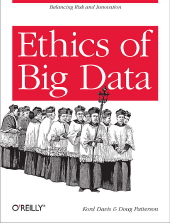Ethical Quandary in the Age of Big Data: Avoid Creepiness
In their forthcoming book, Kord Davis and Doug Patterson argue that there isn’t yet an ethical framework or common vocabulary for having productive discussions around the ethical use of big data.
Topics
Competing With Data & Analytics
 In their forthcoming book, Kord Davis and Doug Patterson argue that there isn’t yet an ethical framework or common vocabulary for having productive discussions around the ethical use of big data.
In their forthcoming book, Kord Davis and Doug Patterson argue that there isn’t yet an ethical framework or common vocabulary for having productive discussions around the ethical use of big data.
Image courtesy of O’Reilly Media.
Ever wonder what Facebook does with all that data it collects from the 900 million of us that post to the social site, sometimes multiple times a day?
Facebook has a Data Science Team that is mining its stunningly large data trove to find societal insights, but insights to help its bottom line too. The Data Science Team, according to a recent article by Technology Review, has been able to determine a person’s relationship status based on the type of songs he or she likes (breakups tend to elicit more ballad Likes), or the mood of, say, an entire country (Chile’s gross national happiness flagged during a 2010 earthquake).
While these insights seem fairly innocuous, it is still early days in the conjoining of data science, social science and big data. What’s to come is already raising important ethical quandaries for some organizations.
Up until recently the prevailing wisdom has been that big data puts power squarely in the hands of consumers, who now have unprecedented insight to act upon. But not always. In June the Wall Street Journal reported that Orbitz utilized data analytics to determine that Mac users will pay higher prices for hotel rooms than will their PC-using counterparts. Which means if you’re searching Orbitz on your MacBook Pro, guess what? You’re getting steered toward higher priced “deals” than your PC-toting buddies.
Orbitz is not alone: organizations as diverse as Google News (and the way it filters the news) to landlords (who can sets rents by using revenue management software) have used analytics to manipulate customer segments, be that the news customers read or the lease agreements they sign.
Amidst all this data mining there is something else to consider: the creepiness factor.
According to the forthcoming book, Ethics of Big Data (O’Reilly Media, 2012), by former Capgemini principal consultant Kord Davis and doctor of philosophy Doug Patterson, as personal data becomes increasingly public, creators of big data will increasingly face ethical decision points.

Comments (3)
Data Science Ethics | Introduction to Data Science, Columbia University
rosariotoday
What Peter Drucker Would Be Reading | The Drucker Exchange